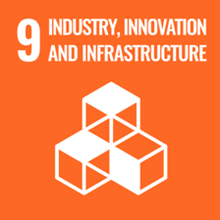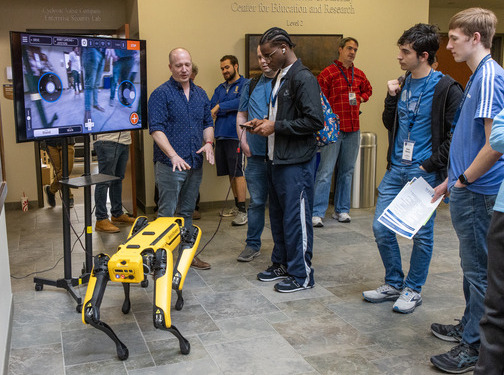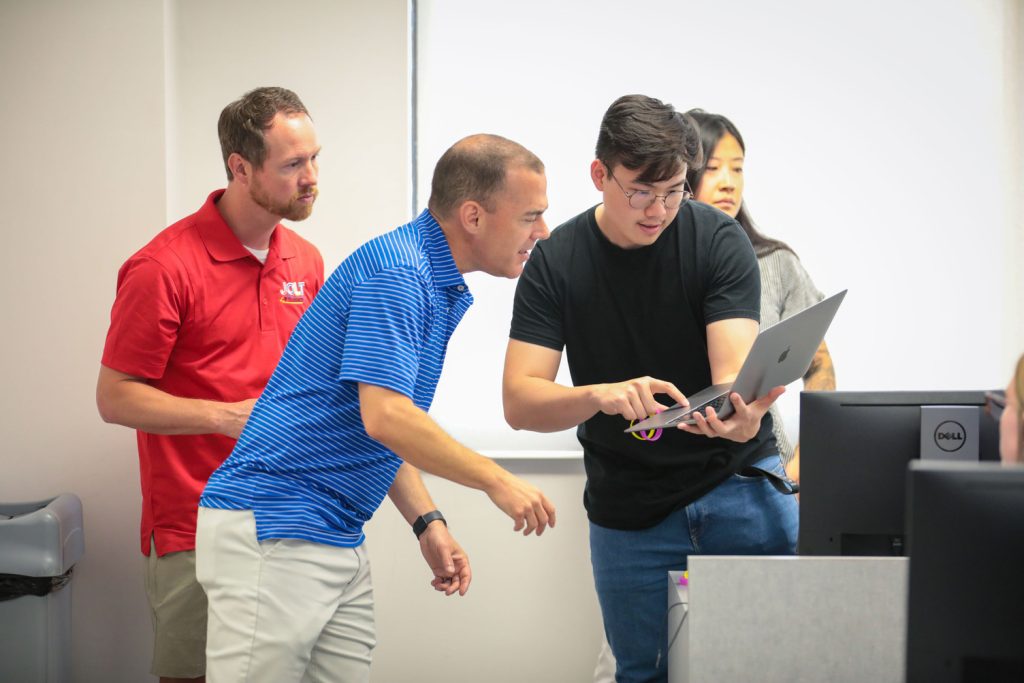
Driving economic growth, fostering sustainable development, and improving the quality of life for people around the world.
This goal envisions a world where technological progress and infrastructure development are harnessed to improve living standards, promote economic growth, and address pressing global challenges, all while minimizing negative environmental impacts. Achieving this goal is essential for fostering innovation, creating job opportunities, and ensuring that the benefits of industrialization and technology are accessible to all, irrespective of their geographical location or socioeconomic status.
The University of Tulsa aims to contribute to Sustainable Development Goal 9 in various ways:
- Research and Innovation: Engage in research and development activities, particularly in fields related to engineering, technology, and science. This research can lead to technological advancements and innovations that contribute to economic growth and sustainable development.
- Academic Programs: Offer academic programs, courses, and degrees in fields such as engineering, computer science, and business that equip students with the skills and knowledge needed to drive technological innovation and contribute to industry development.
- Technology Transfer: Facilitate technology transfer and collaboration with industry partners to bring innovative solutions and products to the market. This can include research partnerships, incubators, and innovation hubs.


- Infrastructure Development: Maintain and enhance campus infrastructure, including laboratories, research facilities, and information technology infrastructure, to support research and innovation activities.
- Sustainability Initiatives: Implement sustainable practices in campus operations and infrastructure development, including energy-efficient buildings, green transportation options, and sustainable waste management.
- Entrepreneurship Support: Provide support for entrepreneurship and startup initiatives among students, faculty, and alumni. This can include business incubators, entrepreneurship programs, and access to funding opportunities.
- Collaboration with Industry: Collaborate with local and regional industries and businesses to address real-world challenges, promote technology adoption, and contribute to economic growth in the community.
- Promoting Sustainable Development: Incorporate sustainability principles into research projects and curricula, emphasizing sustainable practices in industry and infrastructure development.
- Public-Private Partnerships: Foster partnerships with government agencies, private sector organizations, and non-profits to jointly address infrastructure and technological challenges that align with SDG 9.
- International Engagement: Promote international collaboration and exchanges that allow students and faculty to gain exposure to global innovation trends and share their expertise with international partners.
By actively participating in research and innovation, offering relevant academic programs, and collaborating with industry and community stakeholders, TU contributes to SDG 9’s objectives of fostering technological advancement, promoting sustainable infrastructure development, and supporting economic growth. Additionally, by integrating sustainability principles into its activities, TU can help ensure that advancements in technology and infrastructure align with broader sustainable development goals and benefit society as a whole.

SDG 9 Targets
At least $6M of total expenditures for research and development should come from Business sources (Domestic or foreign for-profit organizations)
$6M+
At least $300K of total expenditures for research and development should come from Non-Profit Organization sources (Domestic or foreign non-profit organizations)
$900K+
At least $1.4M of total research and development expenditures that were externally funded should come as contract agreements
$2.4M
Research
5+
Total Scholars
244
Total Publications
News
- Stuart Price (J.D. ’82) moved to Tulsa in the late 1970s to attend The University of Tulsa’s College of Law, discovering after graduation that his calling was actually as an […]
- UTulsa is researching blending hydrogen into natural gas pipelines to reduce carbon emissions by replacing a portion of the methane in the gas with hydrogen, which produces no carbon dioxide […]
- At The University of Tulsa, innovation is taking a step forward with the development of an advanced solar energy conversion system that combines two cutting-edge technologies: concentrated solar power (CSP) […]
- One of The University of Tulsa’s newest faculty members holds an unconventional yet fascinating background. Justin Miller, associate professor of practice of cyber studies, says his career trajectory is a […]
- University of Tulsa mechanical engineering alumnus Tim Latimer (BS ’12) was dealing with drilling equipment that kept breaking from the high temperatures deep underground. “I had never even heard of […]
- This opinion column was written by Andrew Morin and was first published in the Tulsa World. Morin is a research assistant professor in the School of Cyber Studies at The […]
- On June 26, The University of Tulsa (UTulsa) welcomed six representatives from China University of Petroleum (CUP)-Beijing to its campus led by Vice President Guangqing Zhang. The visit marked a […]
- Eleven students from The University of Tulsa are participating in the Future Green Energy Leaders Summer Program hosted by China University of Petroleum, Beijing (CUPB). This is the first time […]
- Launched in spring 2023, The University of Tulsa’s Center for Energy Studies is taking a leading role in the interdisciplinary study, teaching, and public communication of the complex economic and […]
- University of Tulsa alumnus Matthew Crall (MS ’17, PhD ’19) is one of the scientists currently breaking new ground in CCS technology.